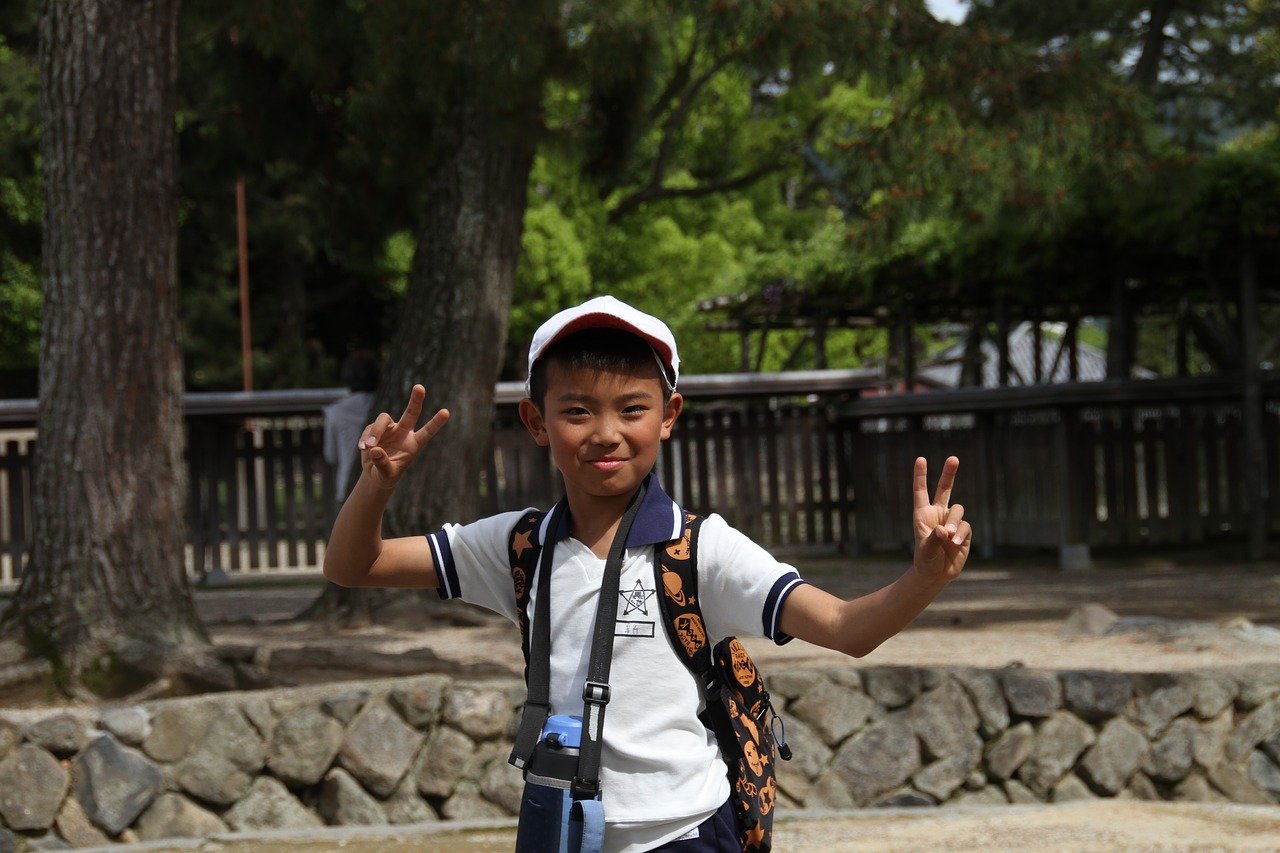Image by Monica Volpin from Pixabay
In this post we’ll cover lots of Japanese vocabulary and structures that will help you talk about your moods, emotions, and feelings.
気分はどうですか。 Kibun wa dou desu ka. How do you feel?
Let’s start with some questions you can ask to find out how people feel.
- 今気分はどうですか。
Ima kibun wa dou desu ka.
How are you feeling right now? - 大丈夫ですか。
Daijoubu desu ka.
Are you okay? Is everything okay? - 機嫌がいいですか、それとも悪いですか。
Kigen ga ii desu ka, soretomo warui desu ka.
Are you in a good mood or a bad mood?
- 楽しんでいますか。
Tanoshinde imasu ka.
Are you having a good time? - どうしましたか。
Dou shimashita ka.
What’s the matter? - {食べ物・映画・パーティー}を楽しんでいますか。
{Tabemono/Eiga/Paatii} o tanoshinde imasu ka.
Are you enjoying the food / the film / the party?
幸せです。 Shiawase desu. I’m happy!
Let’s start with some really basic happy stuff.
- 幸せです。
Shiawase desu.
I am happy. - {天気がよくて・ いいニュースを聞いて}嬉しいです。
{Tenki ga yokute/Ii nyuusu o kite} ureshii desu.
I am happy about the weather/the good news. - {この歌・いいニュース}は私を幸せにしてくれます。
{Kono uta/Ii nyuusu} wa watashi o shiawase ni shite kuremasu.
This song/Good news makes me happy. - 今日は気分がいいです。
Kyou wa kibun ga ii desu.
I’m in a really good mood today. - 太陽が光り輝いているので気分がいいです。
Taiyou ga hikari kagayaite irunode kibun ga ii desu.
I’m in a good mood because of the sunshine. - いい天気の時はいつも気分がよくなります。
Ii tenki no toki wa itsumo kibun ga yoku narimasu.
Nice weather always puts me in a good mood. - どうして笑っているんですか。
Doushite waratte irundesu ka.
Why are you smiling? - 幸せだから笑っているんです。
Shiawase dakara waratte irundesu.
I’m smiling because I’m happy. - どうして笑っているんですか。
Doushite waratte irundesu ka.
Why are you laughing? - このビデオがおもしろいから笑っているんです。
Kono bideo ga omoshiroi kara waratte irundesu.
I’m laughing because this video is funny.
私は悲しいです! Watashi wa kanashii desu! I’m sad!
Now let’s cover some basic unhappy things.
- 私は悲しいです。
Watashi wa kanashii desu.
I am sad. - 今日は少し気分が沈んでいます。
Kyou wa sukoshi kibun ga shizunde imasu.
I’m feeling a bit down today. - {天気が悪くて・悪いニュースを聞いて}気分が沈んでいます。
{Tenki ga warukute/Warui nyuusu o kiite} kibun ga shizunde imasu.
I am sad about the weather/the bad news. - {この歌・雨}はいつも私を悲しい気持ちにさせます。
{Kono uta/Ame} wa itsumo watashi o kanashii kimochi ni sasemasu.
This song/The rain always makes me sad. - 今日私はイライラしています。
Kyou watashi wa iraira shite imasu.
I’m in a bad mood today. - 私は疲れているのでイライラしています。
Watashi wa tsukarete iru node iraira shite imasu.
I’m in a bad mood because I’m tired. - 交通渋滞はいつも私をいらつかせます。
Koutsuu juutai wa itsumo watashi o iratsukasemasu.
Traffic always puts me in a bad mood. - どうして泣いているんですか。
Doushite naite irundesu ka.
Why are you crying? - とても悲しいから泣いています。
Totemo kanashii kara naite irundesu.
I’m crying because I’m very sad. - 今少しむかついています。
Ima sukoshi mukatsuite imasu.
I’m a little upset now. - {彼女・彼氏}にむかついています。
{Kanojo/Kareshi} ni mukatsuite imasu.
I’m upset with my girlfriend/my boyfriend. - {レストラン・映画・友達}にはがっかりしました。
{Resutoran/Eiga/Tomodachi} niwa gakkari shimashita.
I’m disappointed by the restaurant / the film / my friends. - 新しい{彼氏・彼女}ができて、うらやましいです。
Atarashii {kareshi/kanojo} ga dekite urayamashii desu.
I’m jealous of your new boyfriend/girlfriend.
楽しんでいます! Tanoshinde imasu! I’m having a great time!
If you’re doing something that you really enjoy, you could say:
- 楽しんでいます。
Tanoshinde imasu.
We’re having a great time here. - パーティーは楽しかったです。
Paatii wa tanoshikatta desu.
I had a great time at the party. - 会えてよかったです!
Aete yokatta desu!
It was wonderful to see you! - 友達と過ごせてとても楽しかったです。
Tomodachi to sugosete totemo tanoshikatta desu.
I really enjoy spending time with my friends. - 今日はとても楽しませていただきました。
Kyou wa totemo tanoshimasete itadakimashita.
We enjoyed ourselves very much today. - とても楽しんでいます。
Totemo tanoshinde imasu.
I’m having a lot of fun. - 友達といつも楽しくやっています。
Tomodachi to itsumo tanoshiku yatte imasu.
I always have fun with my friends. - 試合は最高に楽しかったです!
Shiai wa saikou ni tanoshikatta desu!
We all had a blast at the game!
旅行が楽しみです。 Ryokou ga tanoshimi desu. I’m excited about my trip.
If you’re excited about something, you may want to say:
- {旅行・新しい仕事}が楽しみです。
{Ryokou/Atarashii shigoto} ga tanoshimi desu.
I’m excited about my trip/my new job. - {週末・この映画を見るの}が楽しみです。
{Shuumatsu/Kono eiga o miruno} ga tanoshimi desu.
I’m looking forward to the weekend/seeing this film. - 何が楽しみですか。
Nani ga tanoshimi desu ka.
What are you excited about? - 何をするのが楽しみですか。
Nani o suruno ga tanoshimi desu ka.
What are you looking forward to doing? - 友達に会うのが楽しみです。
Tomodachi ni auno ga tanoshimi desu.
I can’t wait to see my friends. - マウンテンバイクに乗るのは楽しいです。
Maunten baiku ni noruno wa tanoshii desu.
Riding a mountain bike is exciting. - この辺では色々な楽しいことができます。
Kono hen dewa iroirona tanoshii koto ga dekimasu.
There are lots of exciting things to do around here. - 早くその本を読みたいです。
Hayaku sono hon o yomitai desu.
I’m very eager to read that book. - 新しい仕事に燃えています。
Atarashii shigoto ni moete imasu.
I’m very enthusiastic about my new job.
退屈です。 Taikutsu desu. I’m bored
Of course, life isn’t only fun and excitement. You will probably experience plenty of times when you want to say:
- 今日はとても退屈です。
Kyou wa totemo taikutsu desu.
I’m really bored today. - この映画はつまらないです!
Kono eiga wa tsumaranai desu!
This film is boring! - 一日中ゴロゴロしてテレビを見ていたいです。
Ichinichijuu gorogoroshite terebi o miteitai desu.
I just feel like lying around and watching TV all day. - 何もしたくありません。
Nani mo shitaku arimasen.
I don’t feel like doing anything. - 悪い天気にうんざりです。
Warui tenki ni unzari desu.
I’m tired of the bad weather. - 仕事にうんざりです。つまらないです。
Shigoto ni unzari desu. Tsumaranai desu.
I’m tired of my job. It’s very dull. - この音楽を聞くとイライラします。
Kono ongaku o kikuto iraira shimasu.
This music annoys me. - 今イライラしています!
Ima iraira shiteimasu!
You’re annoying me right now! - この歌には耐えられません。
Kono uta niwa taeraremasen.
I can’t stand this song. - この{音・光・におい}に我慢できなくなってきました。
Kono {oto/hikari/nioi} ni gaman dekinaku natte kimashita.
The sound/light/smell is getting on my nerves.
色々と考えていることがあります。 Iroiro to kangaete iru koto ga arimasu. I have a lot on my mind.
Sometimes it’s hard for us to focus because we’re thinking of something else.
- 気が散っているように見えますよ。
Ki ga chitte iru you ni miemasu yo.
You seem distracted. - 何か考えていることがありますか。
Nani ka kangaete iru koto ga arimasu ka.
Is there something on your mind? - とても忙しくて、押しつぶされそうです。
Totemo isogashikute oshitsubusaresou desu.
I’m very busy. I feel overwhelmed. - {夫・妻・友達}のことが心配です。
{Otto/Tsuma/Tomodachi} no koto ga shinpai desu.
I’m worried about my husband/my wife/my friend. - 気持ちが少し沈んでいます。
Kimochi ga sukoshi shizunde imasu.
I feel a little depressed. - 仕事のことが心配です。
Shigoto no koto ga shinpai desu.
I’m anxious about my job. - 病院に行かなければいけないので不安です。
Byouin ni ikanakereba ikenainode fuan desu.
I’m nervous because I have to go to the hospital. - {母・父・息子・娘}のことが心配です。
{Haha/Chichi/Musuko/Musume} no koto ga shinpai desu.
I’m worried about my mother/my father/my son/my daughter. - 仕事に集中できません。
Shigoto ni shuuchuu dekimasen.
I can’t focus on my work. - 混乱しています。集中しなければいけません。
Konranshite imasu. Shuuchuu shinakereba ikemasen.
I’m confused. I need to concentrate. - ここは居心地が悪いです。
Koko wa igokochi ga warui desu.
I’m uncomfortable here. - {ここにいると・この話題は}居心地が悪くなります。
{Koko ni iruto/Kono wadai} wa igokochi ga waruku narimasu.
This place/conversation makes me uncomfortable.
怖いです! Kowai desu! I’m afraid!
There are lots of ways to talk about things that you’re frightened of.
- {暗闇・クモ}が怖いです。
{Kurayami/Kumo} ga kowai desu.
I’m afraid of the dark / spiders. - この映画は怖いです!
Kono eiga wa kowai desu!
This film is terrifying! - 悪夢を見ると思います。
Akumu o miruto omoimasu.
I’m going to have nightmares. - 何が怖いですか。
Nani ga kowai desu ka.
What are you afraid of? - 高所恐怖症です。
Kousho kyoufushou desu.
I’m afraid of heights. - ヘビを見てびっくりしました。
Hebi o mite bikkuri shimashita.
I was startled when I saw the snake. - ネズミを見て悲鳴を上げました。
Nezumi o mite himei o agemashita.
I screamed when I saw a mouse. - パニックになっています。落ち着かなければいけません。
Panikku ni natte imasu. Ochitsukanakereba ikemasen.
I’m freaking out! I need to calm down.
とても怒っています。 Totemo okotte imasu. I’m very angry.
Some emotions are much stronger than other.
- 今とても怒っています。
Ima totemo okotte imasu.
I’m very angry right now. - どうして怒っているんですか。
Doushite okotte irundesu ka.
Why are you angry? - 私のことを怒っていますか。
Watashi no koto o okotte imasu ka.
Are you angry at me? - {友達・夫・妻・上司}に腹を立てています。
{Tomodachi/Otto/Tsuma/Joushi} ni hara o tatete imasu.
I’m furious with my friend/my husband/my wife/my boss. - その{写真・本・映画}を見ると気分が悪くなります。
Sono {shashin/hon/eiga} o miruto kibun ga waruku narimasu.
That photo/book/film disgusts me. - その{写真・本・映画}を見ると気分が悪くなります。
Sono {shashin/hon/eiga} o miruto kibun ga waruku narimasu.
That photo/book/film is disgusting. - その話は怖かったです。
Sono hanashi wa kowakatta desu.
The story horrified me. - ニュースは怖かったです。
Nyuusu wa kowakatta desu.
I was horrified by the news. - とても嫌な気持ちになりました。
Totemo iyana kimochi ni narimashita.
I’m very offended. - 傷つきました。
Kizutsukimashita.
My feelings are hurt.
後悔しています。 Koukaishite imasu. I regret it.
Sometimes we do or say things that make us feel unpleasant emotions.
- とても恥ずかしいです!
Totemo hazukashii desu!
I’m so embarrassed! - 私は大ばか者でした。
Watashi wa oobakamono deshita.
I feel like a fool. - 私はまぬけでした。
Watashi wa manuke deshita.
I feel like a jerk. - {した・言った}ことを申し訳ないと思っています。
{Shita/Itta} koto o moushiwakenai to omotte imasu.
I feel guilty for what I did / said. - そう言ったことを後悔しています。
Sou itta koto o koukaishite imasu.
I regret saying that. - 気分を害してしまって申し訳ないと思っています。
Kibun o gaishite shimatte moushiwakenai to omotte imasu.
I feel terrible for offending you. - 私の{した・言った}ことを謝りたいです。
Watashi no {shita/itta} koto o ayamaritai desu.
I want to apologize for what I did / said. - 嘘をついてごめんなさい。
Uso o tsuite gomen’nasai.
I’m sorry I lied to you. - 傷つけてしまってごめんなさい。
Kizutsukete shimatte gomen’nasai.
I’m sorry I hurt your feelings. - 許してくれますか。
Yurushite kuremasu ka.
Can you forgive me?
リラックスしています。 Rirakkusu shite imasu. I’m relaxed.
Hopefully there are plenty of times when you feel just right.
- 心がとても落ち着いています。
Kokoro ga totemo ochitsuite imasu.
I feel very calm. - とてもリラックスしています。
Totemo rirakkusu shite imasu.
I’m very relaxed. - 仕事にとても満足しています。
Shigoto ni totemo manzokushite imasu.
I’m very satisfied with my job. - {子供たち・兄・弟・姉・妹}を誇りに思います。
{Kodomotachi/Ani/Otouto/Ane/Imouto} o hokori ni omoimasu.
I feel proud of my children / my older brother / my younger brother / my older sister / my younger sister. - よかったですね!
Yokatta desu ne!
I’m very happy for you! - 何も心配していません。
Nani mo shinpaishite imasen.
I’m not worried about anything at all. - 悩みごとを全部忘れてしまいました。
Nayamigoto o zenbu wasurete shimaimashita.
I have forgotten all of my troubles. - ここに座って{海・空・木}を見ているだけで幸せです。
Koko ni suwatte {umi/sora/ki} o miteiru dakede shiawase desu.
I’m content just sitting here and looking at the ocean / the sky / the trees. - 今とても心地いいです。
Ima totemo kokochi ii desu.
I’m very comfortable right now. - 心地よくくつろいでいます。
Kokochi yoku kutsuroide imasu.
I feel perfectly at ease.
Learn Japanese with the Language Garage
Check out our other posts on Japanese language, culture, and more. And if you’re looking for convenient and affordable live Japanese lessons with a real teacher, check out the Language Garage. Our lessons are given online in a virtual classroom, so it doesn’t matter where you live or work – we can come to you. And we have flexible options, with a free trial so that you can decide if there’s a fit. Check us out!
Free Student Book and Audio
You can access our original student book and practice audio here. If you’d like to use it with an instructor, you can enroll in lessons. Or you can use it on your own as self-study, totally free.




